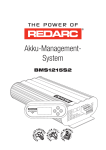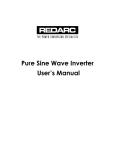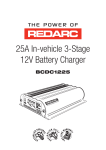Download Redarc SBC1205 Operating instructions
Transcript
TWO YEAR WARRANTY
REDARC Electronics warrants to the original purchaser that the product(s) on the reverse side of this sheet ("Product") will be free, under normal
use and maintenance, from defects in material and workmanship for a period of TWO YEARS from the date of purchase, subject to the conditions shown below.
1.
Warranty
Unless otherwise stated in this warranty, Redarc Electronics will at its sole discretion either replace or repair any of the Product that is
defective in material or workmanship within the abovementioned period without charge to the original purchaser.
2.
Other Warranty
Subject to any terms implied by law, this warranty contains the whole of the Redarc Electronics' obligations and any distributor and the
agents, officers and employees of such distributor and of Redarc Electronics are not authorised to vary or extend the terms of the warranty. The benefits conferred by this warranty are in addition to the conditions and warranties implied by applicable legislation conferring
rights upon consumers, which apply only to the extent to which they may not by law be excluded.
3.
SBC1205
Exclusions
SMART BATTERY CHARGER
This warranty shall not apply to, or include, any of the following:
4.
5.
3.1
Any defect or failure due to accident, misuse, abuse, movement of the Product to a new site, negligence, non-observance of
any of the instructions supplied with the Product including the instructions on the reverse side of this sheet ("Operating Instructions") or local regulations on the part of any user, choice of location, improper installation, configuration or connection, or
faulty power supply.
3.2
If the Product is installed, repaired or serviced by a person who is not a qualified auto electrician or electronics technician, or if
non-approved parts have been fitted.
3.3
Failure to obtain proper maintenance for the Product or any associated equipment or machinery.
3.4
Failure to pay for the products in full or comply with Redarc Electronics' Trading Terms.
3.5
If the Product is used other than for any reasonable purpose for which it was manufactured, or is used in a way not specified by
Redarc Electronics.
3.6
If the original purchaser sells, leases or otherwise parts with possession of the Product.
3.7
Deterioration due to normal use and exposure, including abnormal environmental conditions such as lightning strike, flood and
extreme heat.
3.8
Any freight, packing and insurance expenses relating to transportation of the Product.
3.9
Any expenses relating to installation and/or removal of the Product.
3.10
Any damage, indirect or incidental, of whatever nature.
Limitations
4.1
Redarc Electronics is not liable for any consequential, indirect or accidental loss or damage or for any service not expressly
provided herein (including without limitation liability for any loss or damage caused by a fault in the Product or its external wiring
connections) and the liability of Redarc Electronics under this warranty is limited to the repair or replacement of defective
material or workmanship by a qualified auto electrician or electronics technician, provided such person and work is approved
by Redarc prior to commencement. Subject to clause 2, Redarc Electronics is hereby excluded to the maximum extent permitted by law from all other liability in respect of the Product.
4.2
While Redarc Electronics warrants, where applicable, that the Product is free from defects in materials and workmanship under
normal use at the time of delivery, Redarc Electronics does not warrant that the Product will meet any user specific requirements
or that the operation of the Product will be uninterrupted or error-free.
12 Volt DC – 5 Amp
Suitable for charging Calcium, AGM, Gel or
Standard Lead Acid batteries
A charger for calcium content batteries which works!
Operating Instructions
& Owners Manual
Owner’s Responsibilities
5.1
Maintenance of the Product and associated equipment and/or machinery is the responsibility of the owner. The owner must
retain evidence that proper maintenance has been performed on the Product by Redarc Electronics or a qualified auto
electrician or electronics technician. Claims made during the warranty term will not be accepted if resulting from lack of
maintenance rather than faulty material or workmanship.
5.2
The owner must operate the Product in accordance with all of the Operating Instructions.
5.3
Upon discovery of a fault the owner must return the Product to the distributor with full details of the nature of the fault. Removal
of the Product must be done by a qualified auto electrician or electronics technician to ensure that the warranty remains valid.
A written report describing the circumstances of failure must accompany the returned Product with proof of purchase which
clearly shows the date of such purchase by the original purchaser.
5.4
If the Product is found to be working satisfactorily on return to Redarc Electronics a reasonable charge will be made for the cost
of testing, packing and freight. The Product will be returned on receipt of the amount charged.
N3533
ELECTRICAL SAFETY APPROVAL NUMBER : Q041193
FREE TECHNICAL ASSISTANCE, contact Redarc Electronics
Ph (08) 8322 4848, Fax (08) 8387 2889
or Email [email protected]
Specifications are subject to change without notification.
R:\Redarc Product Spec Sheets NEW\AC Battery Chargers\SBC1205 Instruction Manual-A5-4.pub
8
1
The REDARC SMART BATTERY CHARGER (SBC) is a “set and forget” four stage charger that automatically
brings and maintains 100% charge to Lead Acid and Calcium content batteries. Being a Smart battery
charger, it is controlled by a microprocessor, which is constantly checking the charging process. A battery
will last longer and charge faster when charged using the Four Stage process.
WARNINGS
For safe operation, please ensure compliance to the following points.
•
If the power cord is damaged, it must be replaced by the manufacturer or its service agent or a similarly
qualified person in order to avoid hazard.
•
The charger is designed to charge batteries constructed with 6 cells only.
•
The charger must only be plugged into an earthed mains socket outlet.
•
For in-vehicle charging,
6.0 CHARGING TIME AND BATTERY CAPACITY
The charging time is dependant on a number of conditions including the ambient temperature and the
general condition or age of the battery. However it is primarily dependant on how many Amp-Hours need
to be put back into the battery to restore full charge, rather than the battery capacity itself. For example,
a 50% discharged 45Ah battery requires 22.5Ah to be restored, while a 50% discharged 70Ah battery
requires 35Ah to be restored. (Note: Due to inefficiencies in the battery, approximately 10% more is
required to be delivered by the charger in practice). Based on the wide variety of conditions, the charger
can be expected to restore approximately between 1 and 3 Amp-Hours per hour of charge.
To determine if a charger is too big for your battery, use the rule of thumb that the maximum battery
charge current should be typically between 10% and 20% of the battery Amp-Hour rating. i.e. for a 50Ah
battery, the typical maximum charging current should be less than 20% of 50Ah = 10A.
As a safety precaution, the maximum charge time has been limited to 25 hours. Please refer to “Ready
indicator (Green) Flashing” in section 3.1 for a description of what happens if the charge cycle does time
out.
1.
The battery charger must be connected first to the battery terminal which is not connected to the
vehicle chassis. The other connection is to be made to the chassis, remote from the battery and fuel
line. The battery charger is then to be connected to the supply mains.
7.0 WARNING:
2.
After charging, disconnect the battery charger from supply mains. Then remove the chassis
connection and the battery connection, in this order.
In the Calcium battery selection mode the charger can achieve a maximum voltage of 16.5V, the
following precautions should be taken:
•
The appliance is not intended for use by young children or infirm persons without supervision.
•
Young children should be supervised to ensure that they do not play with the appliance.
•
This appliance is not intended for permanent mounting into a vehicle.
•
•
•
•
KEY FEATURES
IN CAR CHARGING
Vehicle ignition must be OFF
Vehicle lights must be OFF
Accessories must be OFF. This includes mobile telephones, radios and sound systems, DVD players
and any other non ignition activated accessories installed.
Be sure any caravans or boats connected to the vehicle, where the battery is being charged also
have all their electrical systems turned off. A good precaution is to disconnect the trailer / caravan
plug from the towed vehicle.
Most new vehicles can tolerate this voltage without damage to the vehicle electrical system. To ensure
that your electrical system will tolerate this maximum charging voltage, please contact your vehicle
service centre.
•
•
Charges Standard, Calcium, AGM or Gel Lead Acid batteries (User Selectable via push button switch)
Reverse polarity connection protection, charging commences after the battery has been connected
correctly
•
Output short circuit protection
8.0 SPECIFICATIONS
•
Battery overcharge protection
•
Faulty battery cell detection and safe charge termination
•
4-Stage Charging Pattern with timeout protection
•
Initial self test on power up
•
Over temperature shut down
•
Latest switch mode design
•
Designed and manufactured in Australia for Australian conditions
•
Safety and EMC compliance
•
Light and ultra compact
•
Recharges batteries to 100% capacity
ELECTRICAL:
AC Input Voltage:
Frequency:
Input Fusing:
Output Fusing:
EMI/RFI:
Safety:
Efficiency:
Nominal Output Voltage:
Output Voltage Range:
Output Current Range:
Output Power:
Output Ripple:
** Not user serviceable
FOR FREE TECHNICAL
ASSISTANCE - Ph: (08) 8322 4848 Fax: (08) 8387 2889 Email: [email protected]
2
FOR FREE TECHNICAL
216- 265V AC
50 Hz
2A Slow Blow **
10A **
AS/NZS CISPR14-1:2003
AS/NZS 3108
>79%
12V
12 - 16.5V
0 - 5A
80W
< 1% at full load
PHYSICAL:
Dimensions:
Weight:
165 x 140 x 60 mm
1.55Kg
Storage Temperature:
Operating Temperature:
-10ºC to + 70ºC
-5ºC to + 50ºC
ASSISTANCE - Ph: (08) 8322 4848 Fax: (08) 8387 2889 Email: [email protected]
7
5.0 SAFETY & PRECAUTIONS
1.0 INSTALLATION
•
Ensure the correct battery type has been selected before charging begins
•
Before connecting or disconnecting the SBC1205 to a battery, ensure that it is disconnected from the
240VAC supply.
•
NOTE disconnecting the battery from the vehicle will cause some components in the vehicle to lose
stored memory or information, such as time on your stereo.
•
Ensure electrolyte levels in the battery to be charged are sufficient to cover the plates (if accessible).
The charger must be placed in a well ventilated position to allow air flow to cool the charger for greater
charging efficiency. The charger is best placed on top of the air filter if charging the battery in the vehicle. If
that is not possible then find a convenient safe place where the charger is secure and not likely to fall down.
NOTE: Never place the charger on top of the battery.
Leave the vent caps closed as modern automotive batteries have a gas recombination design built into the
cap to allow the retention of the gassed electrolyte and its return to the battery cell. All vent caps also have a
venting system to allow excessive gasses to escape. Coin screwed cap designs also have a “manifold”
venting system, which works in the same way as a screwed vent cap.
•
DO NOT attempt to charge NON RECHARGEABLE batteries.
•
DO NOT use the charger to charge a battery near a naked flame. The gasses emitted by the battery
whilst charging may ignite, causing a life threatening fire or explosion.
•
Always wear eye protection if working close to a charging battery.
•
Never smoke in the vicinity of a charging battery.
•
Take care whilst handling a lead acid battery, as the electrolyte is acidic and may cause permanent
damage to skin or clothing.
•
The charger is designed to be used indoors and to be protected from the elements. Do not expose the
battery charger to the weather, particularly rain or dampness.
2.0 SELECTING A BATTERY TYPE
•
Provide adequate ventilation whilst charging lead-acid batteries. This will ensure the charger will work
at maximum efficiency and that any gasses emitted from the battery are safely dissipated.
You will have 60 seconds from the moment the charger is turned on to make the selection.
Do not extend the 12V output cables supplied between the charger and the battery to be charged,
otherwise efficiency of operation will be compromised. Ensure the output clamps are firmly attached
to the battery poles.
Flooded cell:
•
•
Incorrectly connecting the Positive (+ Red wire) and Negative (- Black wire) at the battery will switch
off the battery charger to protect it’s internal electronics. Output and consequent charging will only
recommence when the (+) and (-) are correctly attached to the corresponding (+) and (-) poles on
the battery.
•
Do not obstruct the fan. Note that the fan will run continuously during the charging cycle.
•
The SBC1205 contains hazardous voltages internally and contains no user serviceable parts. Return to
supplier for any service needs.
•
If the power cord is damaged, it must be replaced by the manufacturer or its service agent or a
similarly qualified person in order to avoid hazard.
•
The charger is designed to charge batteries constructed with 6 cells only.
•
The charger must only be plugged into an earthed mains socket outlet.
•
For in-vehicle charging,
1.
2.
The battery charger must be connected first to the battery terminal which is not connected to the
vehicle chassis. The other connection is to be made to the chassis, remote from the battery and
fuel line. The battery charger is then to be connected to the supply mains.
After charging, disconnect the battery charger from supply mains. Then remove the chassis
connection and the battery connection, in this order.
•
The appliance is not intended for use by young children or infirm persons without supervision.
•
Young children should be supervised to ensure that they do not play with the appliance.
•
This appliance is not intended for permanent mounting onto a vehicle.
1.1 Connections
Ensure the connections are tight and sound. Then connect the 240VAC three pin plug to the power point and
switch on the power. Then switch on the Smart Battery Charger power switch (located on the rear panel).
Once turned ON, the charger will pause momentarily, then light up all the indicators in a sequence so you
can see that they are all functional. The cooling fan will also be run up and tested during this sequence.
Using the Battery Type Selector button, select the battery type to be charged. The battery options are;
Standard Lead Acid
Calcium content Lead Acid
Non-flooded cell:
Gel/AGM
By default, a Gel/AGM battery type is selected (Green Indicator ON).
BATTERY TYPE SELECTOR
Press button to select the battery type
pb ca gl
Press
Gel/AGM
gl
Calcium Flooded ca
Standard Flooded pb
During the selection period, the selected battery type LED will flash. Once 60 seconds has expired, the
selection is locked in for the remainder of the charging period and the selected battery type LED will remain
permanently illuminated. Should an incorrect battery be selected, the battery charger should be turned off for
approximately 10 seconds, then turned back on. The correct battery selection can now be made.
When the Ready indicator (GREEN) is ON, the battery has finished charging.
If the Fault indicator (RED) is flashing, a fault has caused the charging process to terminate. The number of
quick flashes, followed by a longer OFF period indicates the nature of the fault. The fault indication will be
reset when the charger is switched OFF.
NOTE: For safety reasons, always switch OFF the battery charger before disconnecting the battery.
FOR FREE TECHNICAL
ASSISTANCE - Ph: (08) 8322 4848 Fax: (08) 8387 2889 Email: [email protected]
6
FOR FREE TECHNICAL
ASSISTANCE - Ph: (08) 8322 4848 Fax: (08) 8387 2889 Email: [email protected]
3
3.0 OPERATION
Ready indicator (Green) Continuously ON
The SBC1205 has been designed to return a discharged battery to 100% charge through a rigorous charging
cycle. This charging cycle assumes that no load is connected to the battery during charging, otherwise full
charge may not be achieved. It is also possible that the charger may determine that the charging
characteristics with a load applied appears like a fault and terminate the charging cycle. Small loads such
as the loads drawn by vehicle electronics with the ignition turned off do not present a problem to normal
operation. The charging cycle consists of a number of stages as described over the page, and when
completed remains in a float mode indefinitely. It is safe to leave the battery connected to the charger as
the float mode will not allow over charging whilst maintaining the battery to a fully charged state.
Ready indicator (Green) Flashing
If the battery remains connected to the charger and a charge cycle completes, the charging cycle will not
restart even if the battery becomes discharged by a load. Instead, the charger will continue in float mode.
The full charge cycle can only be restarted by turning the charger off, waiting for approximately 10
seconds, then turning it back on again.
A B S O R P TIO N
E Q U A LIS E
Indicates that the battery capacity has exceeded the maximum charge time allowable in one charge cycle.
The battery charging process has timed out, the charger is now in the maintenance mode (Float), where it will
keep the battery at its current level of charge indefinitely. The charger can now be turned off and back on
again to restart the charging cycle and hence achieve full charge.
4.0 TROUBLE SHOOTING
The Redarc SBC1205 is one of the most advanced chargers on the market. It has been designed to detect and
advise the operator of a variety of fault conditions, and will terminate the charging cycle immediately a fault is
detected. This ensures that the charger does not attempt to charge a faulty battery, which protects the
charger, battery and most importantly the user.
4-STAGE CHARGING PROCESS
BOOST
Indicates that the battery charging process is complete, and full charge (100%) has been achieved. The
charger is now in the maintenance mode (Float), where it will keep the battery at full charge indefinitely
without the fear of overcharging. The battery is ready for use, and can be disconnected.
F LO A T
4.1 Fault Detection LED (Red)
CHARGE
V O L TA G E (V )
When faults are detected, the charger shuts down the charging process and displays the nature of the
fault via a Red flashing LED. Possible faults are;
Continuously on-Hardware failure detected:
The SBC1205 failed its self-test on power up. The unit should be returned to the supplier for inspection.
C H A R G IN G
T IM E
One Flash-Over current detected:
An excessive current will cause this fault. This will indicate a faulty battery if it occurs during a charging
cycle, but not necessarily if it happens upon connection. This fault may also be triggered by trying to
charge a lower voltage battery than specified e.g. 6V on a 12V charger.
Fault
CHARGE
C U R R E N T (A )
Two Flashes-Voltage problem detected:
3.1 Indicators
There are three visual indicators to assist the operator during the charging process, and these are
described below.
A battery that remains at a low voltage for too long or a battery which has a higher voltage than specified, will
cause this fault e.g. attempting to charge a 24V battery on a 12V charger.
Three Flashes-Faulty battery detected:
Charging indicator (Orange)
This indicator is used during the first three stages of charging (Boost, Absorption and Equalise), and flashes at
different rates to indicate the charging mode.
Boost Mode: Orange indicator ON-single flash. This mode delivers the bulk charge to the battery by
delivering maximum constant current. This stage is time limited to cater for a fully discharged 40Ah battery,
however the time taken in this mode does greatly depend on the condition and state of charge of the
battery.
Absorption Mode: Orange indicator ON-double flash.
This mode must be finished before Equalise can take place. The charger maintains constant charging
voltage, while the current reduces. This voltage is close to the gassing voltage of the electrolyte.
Equalise Mode: Orange indicator ON – triple flash.
This mode brings the battery to full charge. A higher voltage is applied to induce some gassing, which mixes
the electrolyte, bringing the cells to equal potential. In a low maintenance battery, most of the hydrogen
and oxygen gasses will recombine and will not dry out the battery.
Charging a battery with a dead cell will result in this fault. With some batteries it might take longer to detect the
fault than in others, depending upon the initial level of charge and also how damaged the battery is. If the
battery is badly damaged, the fault may show up as over current.
Four Flashes- Overheat:
The charger is too hot to operate, the charging process is suspended, and will recommence once the charger
has cooled down. This can happen on a very hot day, if the charger is positioned in a very hot place while
charging or if the ventilation holes have been blocked. Also, the fan may not be functioning properly.
4.2 Electrolyte (Not applicable for AGM/Gel battery types)
If the battery charger detects a fault it will shut down immediately. In this case, check if connections to the
battery are tight. Is the battery sound? Check the electrolyte levels and use a Hydrometer to check for “dead”
cells. A lead-acid battery is considered to be discharged when the specific gravity of the electrolyte is less than
1.16.
Note that this mode is not run for Gel/AGM batteries.
FOR FREE TECHNICAL
ASSISTANCE - Ph: (08) 8322 4848 Fax: (08) 8387 2889 Email: [email protected]
4
FOR FREE TECHNICAL
ASSISTANCE - Ph: (08) 8322 4848 Fax: (08) 8387 2889 Email: [email protected]
5













